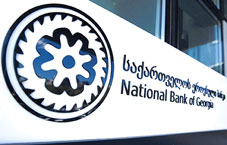
National Bank of Georgia sells $27.5 million at the foreign auction as Lari depreciates by 2.6% last month
By Veronika Malinboym
Friday, April 2
Earlier today, the National Bank of Georgia (NBG) announced that it sold $27,5 million at an international auction. The National Bank originally put 40 million up for sale, and the average weighted exchange rate was 3.4401. Last week the NBG sold $40 million at the auction in an attempt to mitigate the effects of the lari exchange rate depreciation, and in February this year, the total amount sold by Georgia at the international auction added up to $56.3 million and bought net foreign exchange amounting to $183.6 million, which increased the country’s total net foreign assets by an approximate of $127.3 million.
Last month, Georgia’s national currency depreciated by 2.6 % against the US dollar. As of today, the official USD/ GELexchange rate stands at GEL3.4410 for $1, and the exchange rate for EUR/GEL today amounted to GEL4.0404 per Euro1.
Following a business meeting with Prime Minister Irakli Garibashvili, General Director of the TBC Bank Vakhtang Butskhrikidze told the journalists that the government will hold a separate meeting with the representatives of the National Bank of Georgia and business to discuss ways of stabilizing the national currency.
The recent forecast released by the World Bank states that it is unlikely for the Georgian economy to recover to pre-COVID levels before the end of 2022:
“The COVID-19 pandemic has hit Georgia hard. Mobility restrictions, a sudden halt to international tourist arrivals, and weak external demand drove an estimated economic contraction of 6.2 percent in 2020. The poverty rate increased by an estimated 5.4 percentage points. Job and income losses were severe. The fiscal deficit and public debt rose above statutory levels as the crisis put pressure on fiscal and external balances”, the world bank report reads.
The report adds that the Georgian economy is expected to expand by 4% in 2021 and 5% in 2022, however, the recovery rate will be highly dependent on a variety of risks including “delayed vaccinations, additional or extended COVID-19 restrictions, tightening global financial conditions, and prolonged political tensions:”
“For a sustained and resilient recovery, Georgia will need a continued focus on slowing the spread of COVID-19 infections, large-scale vaccination, and addressing longer-term challenges, including human capital, strengthening institutions and promoting a digital and green recovery,” stated the World Bank Regional Director for the South Caucasus Sebastian Molineus.

